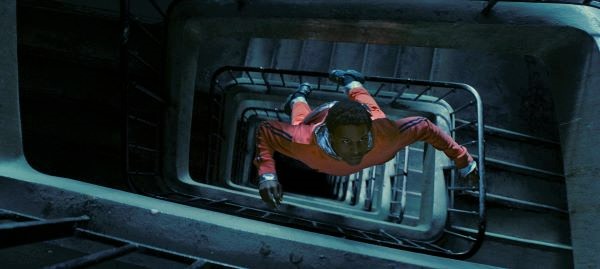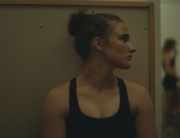The charming French film Gagarine has its feet in working-class solidarity and its head in the stars. The story of a soon-to-be-demolished Paris housing project and its inhabitants’ unlikely connection to the moon, Fanny Liatard and Jérémie Trouilh’s work quietly mourns the failed promises of the past while aspiring to a higher, more transcendent path ahead.
The film is built around the lifespan of a real housing project, Cité Gagarine, inaugurated in 1963 and named after the famous Russian cosmonaut Yuri Gagarin. It opens with black-and-white vintage footage from the 1960s of the vast estate’s inauguration, then moves on to happy color scenes of 1970s communal dances and roller skating, a reminder that public housing once heralded a hopeful future. The buildings are hulking examples of brutalism, but the camera hovers over them as though contemplating the life—and many lives—within.
Fast-forward some 55 years, when the now-dilapidated Gagarine is slated to be depopulated and knocked down (the fate of the actual complex in 2019). Black teenager Youri (Alséni Bathily); vivacious Diana (Papicha’s Liana Khoudri), who lives in a nearby community with her Roma family; and other pals hang around the estate, working on improvised engineering projects, sometimes to prove the buildings can be salvaged, other times simply for fanciful fun. Salt-of-the-earth neighbors enjoy a shared sense of community, even joy, but their happy days together are numbered. Challenges to bureaucrats and half-baked attempts to forestall the demolition end up nowhere.
Abandoned by his mother, Youri resolves to stay on in the buildings even as wrecking crews approach. Alone and embattled in a homemade biosphere, he descends into a fantasy world of space adventure and escape. Gagarine loses altitude by dwelling on the motherless boy trying to hold on as the environment around him collapses. Although poignant, his story inevitably goes where a story in a movie this fanciful can only go: toward magical realism.
Where the film really excels is in weaving elements of reality through the fictional scenes. The filmmakers find spot-on, meaningful use for archival footage, from the images of astronauts floating in limbo to the Challenger explosion and its echoes of disaster. Recorded snippets of Gagarine’s former residents wistfully recalling the lost sense of community there add a layer of genuine sadness. Once home to thousands, the utilitarian housing project now shines in the dark as a memory far, far away—a kind of lost moon for our time.

















Leave A Comment